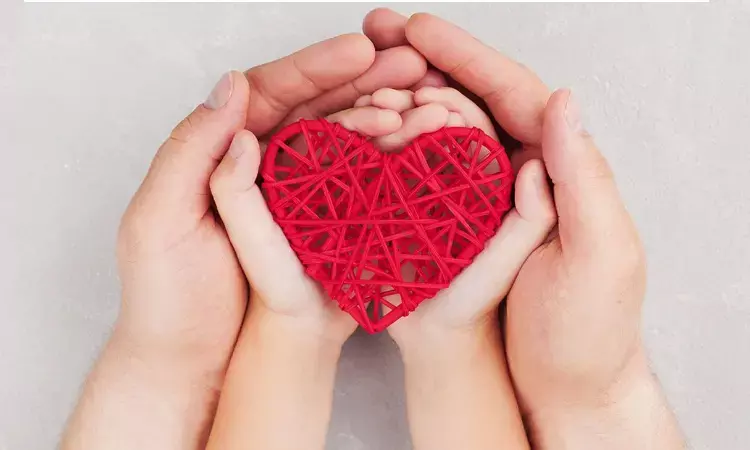- Home
- Medical news & Guidelines
- Anesthesiology
- Cardiology and CTVS
- Critical Care
- Dentistry
- Dermatology
- Diabetes and Endocrinology
- ENT
- Gastroenterology
- Medicine
- Nephrology
- Neurology
- Obstretics-Gynaecology
- Oncology
- Ophthalmology
- Orthopaedics
- Pediatrics-Neonatology
- Psychiatry
- Pulmonology
- Radiology
- Surgery
- Urology
- Laboratory Medicine
- Diet
- Nursing
- Paramedical
- Physiotherapy
- Health news
- Fact Check
- Bone Health Fact Check
- Brain Health Fact Check
- Cancer Related Fact Check
- Child Care Fact Check
- Dental and oral health fact check
- Diabetes and metabolic health fact check
- Diet and Nutrition Fact Check
- Eye and ENT Care Fact Check
- Fitness fact check
- Gut health fact check
- Heart health fact check
- Kidney health fact check
- Medical education fact check
- Men's health fact check
- Respiratory fact check
- Skin and hair care fact check
- Vaccine and Immunization fact check
- Women's health fact check
- AYUSH
- State News
- Andaman and Nicobar Islands
- Andhra Pradesh
- Arunachal Pradesh
- Assam
- Bihar
- Chandigarh
- Chattisgarh
- Dadra and Nagar Haveli
- Daman and Diu
- Delhi
- Goa
- Gujarat
- Haryana
- Himachal Pradesh
- Jammu & Kashmir
- Jharkhand
- Karnataka
- Kerala
- Ladakh
- Lakshadweep
- Madhya Pradesh
- Maharashtra
- Manipur
- Meghalaya
- Mizoram
- Nagaland
- Odisha
- Puducherry
- Punjab
- Rajasthan
- Sikkim
- Tamil Nadu
- Telangana
- Tripura
- Uttar Pradesh
- Uttrakhand
- West Bengal
- Medical Education
- Industry
Bystander CPR may improve survival in exercise-related sudden cardiac arrest: BJSM

Canada: A new study shows that exercise-related sudden cardiac arrest (SCA) is more common in men and is usually accompanied by a shockable ventricular arrhythmia, emphasizing the significance of quick access to defibrillation.Therefore Bystander CPR may play and important role in improving survival in exercise-related sudden cardiac arrest
This study was conducted by Nicholas Grubic & team and the results were published in the British Journal of Sports Medicine on 1st December 2021.
This study was a systematic review with the goal of evaluating bystander interventions and survival rates following exercise-related SCA. From the beginning of the study through November/December 2020, MEDLINE, EMBASE, PubMed, CINAHL, SPORTDiscus, Cochrane Library, and grey literature sources were searched.
Observational studies examining a population of exercise-related SCA (out-of-hospital cardiac arrests that occurred during exercise or within 1 hour of cessation of activity) where bystander cardiopulmonary resuscitation (CPR) and/or automated external defibrillator (AED) use were reported, as well as survival outcomes. The median (IQR) percentage of bystander CPR and bystander AED usage, as well as the median (IQR) rate of survival to hospital discharge, were determined across all included studies.
This evaluation includes 29 studies with a median study period of 78.7 months and a median sample size of 91 participants. The majority of exercise-related SCA patients were middle-aged (median: 51, IQR: 39-56 years) and presented with a shockable arrest rhythm. Bystander CPR was used in a median of 71 percent of arrests, whereas bystander AED was used in a median of 31 percent of arrests. The median survival rate was 32 percent of the 19 trials that reported survival to a hospital release. Bystander CPR and AED usage were linked to survival following exercise-related SCA in studies that looked at the association between bystander interventions and survival outcomes.
In conclusion, bystander CPR was given to 71% of exercise-related SCA patients, and 31% had an AED applied by a bystander. Exercise-related SCA had a median survival rate of 32% to a hospital release. Exercise-related SCA requires more efforts to encourage early detection and quick bystander intervention.
Reference:
Grubic N, Hill B, Phelan D, Baggish A, Dorian P, Johri AM. Bystander interventions and survival after exercise-related sudden cardiac arrest: a systematic review. Br J Sports Med. 2021 Dec 1:bjsports-2021-104623. doi:10.1136/bjsports-2021-104623. Epub ahead of print. PMID: 34853034.
Medical Dialogues consists of a team of passionate medical/scientific writers, led by doctors and healthcare researchers. Our team efforts to bring you updated and timely news about the important happenings of the medical and healthcare sector. Our editorial team can be reached at editorial@medicaldialogues.in.
Dr Kamal Kant Kohli-MBBS, DTCD- a chest specialist with more than 30 years of practice and a flair for writing clinical articles, Dr Kamal Kant Kohli joined Medical Dialogues as a Chief Editor of Medical News. Besides writing articles, as an editor, he proofreads and verifies all the medical content published on Medical Dialogues including those coming from journals, studies,medical conferences,guidelines etc. Email: drkohli@medicaldialogues.in. Contact no. 011-43720751


